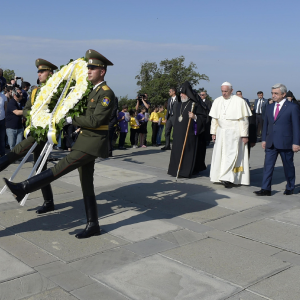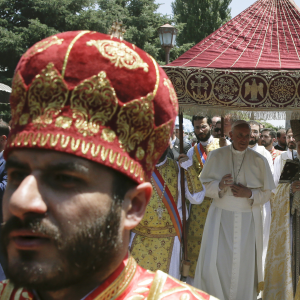Francis visited the Tsitsernakaberd Armenian Genocide Memorial Complex, to “reflect and meditate” on
the lives of the martyrs who were killed in 1915. And it was here, against the backdrop of snow-capped Mount Ararat, faintly visible in the distance, that he continued his demonstration of solidarity with the Armenian people.
Francis wrote a powerful declaration of condolence in the Memory Book, which the Vatican was quick to downplay. “Here I pray with pain in my heart, so that never more will there be tragedies like this, so that humanity does not forget and knows how to overcome the evil with good...May God protect the memory of the Armenian people. Memory should not be diluted or forgotten. Memory is source of peace and the future.”
These actions, said Father Federico Lombardi, head of the Holy See press office, “were not to renew conflicts” but were “only, only, only” to help foster mutual understanding, dialogue and reconciliation. And it is this reason that the Vatican saw no reason for Turkey to have any problems as a result of these
actions.
Armenia’s second city of Gyumri in the north-west Shirak region was Pope Francis’ next stop. Home to most of the nation’s Catholic minority, the city became known to the world when it was all but destroyed during the 1988 Armenian earthquake. Unemployment in Gyumri is nearly 50 per cent and the effects of extreme poverty are visible in almost every part of the city. It was a personal request of Pope Francis to visit the city and host a Divine Liturgy in the city’s Vardanants Square.
Francis spoke about the importance of memory, faith and merciful love. Karekin II, Catholicos of All Armenians, declared the visit to Gyumri “a spiritual renewal” for the faithful of the region of Shirak, and a new testimony to the fraternal relationship between our churches.
“I want to kiss him and tell him I love him for not forgetting us in Gyumri”, said Zina Hovhannisyan, a Gyumri local. While Garnik Hakobyan simply said: "I want to tell him that he is like my father, he is a father to all of us”.
Joelle Bilezikjan, an Armenian Catholic from Beirut said that coming to Armenia and then to Gyumri to see the Holy Father felt like "finally coming home". She had travelled from Lebanon as part of a group, and hoped that Francis’ message would give them some “new strength” to cope with the “many great difficulties of life in Lebanon”.
Sofik Sargsyan, from Tashir a town north of Gyumri, had travelled to see Francis as she was in great pain. “My eyes, they always hurt, I can sometimes not even see”, she said, “I feel that he might help my pain, he is such a nice man, he loves people”.
And the final stop for the day was to Yerevan. To hold an ecumenical service and peace prayer in the city’s majestic Republic Square. The rose pink tufa stone of the government buildings lining the square
shimmered in the gently fading early summer light, while the Philharmonic and Armenian State a capella provided a score, which included the melodies of Aram Khatchaturian, so beloved of Armenians. It seemed the whole city was waiting for him. Young, old, entire families, entire school classes, nursing mothers, frail grandfathers.
And the standout message was the call for us to become peacemakers and to use remembrance insofar that it may create and sustain unity. He made specific references to the troubles in the region: “May God...grant that the people of Armenia and Turkey take up again the path of reconciliation, and may peace also spring forth in Nargorno Karabakh”.
And in the front row were the injured soldiers, many in wheelchairs, from the recent so-called "four-day war" in Karabakh, waiting for their personal blessings. But the most stirring message was his address to the young people. "The future", he said, "belongs to you.”
Francis left the crowd of more than 50,000 with the words: “Pace a voi!” And with that the orchestra and choir erupted into Handel’s Hallelujah Chorus. A truly joyous celebration of peaceful prayer.




 Loading ...
Loading ...